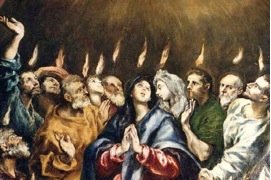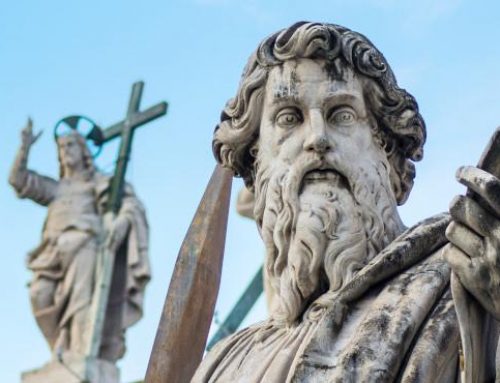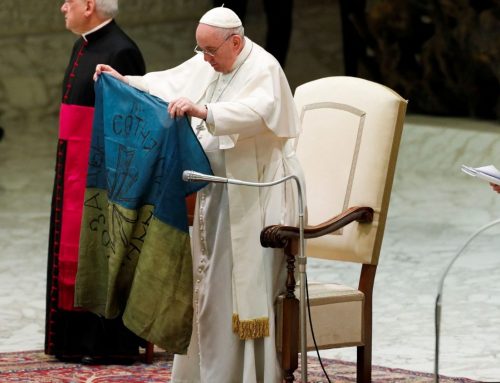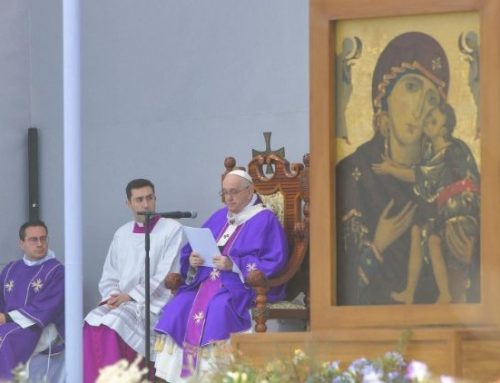“Faced with the needs of others, we are called to deprive ourselves of essential things, not only the superfluous; we are called to give the necessary time, not only what remains extra; we are called to give immediately and unconditionally some of our talent, not after using it for our own purposes or our own group”
“Faced with the needs of others, we are called to deprive ourselves of essential things, not only the superfluous; we are called to give the necessary time, not only what remains extra; we are called to give immediately and unconditionally some of our talent, not after using it for our own purposes or our own group”
Dear brothers and sisters, good morning… on such a beautiful, sunny day!
The Gospel passage of this Sunday is composed of two parts: one that describes how not to be followers of Christ; the other proposes an ideal model of a Christian. Let’s start first: what not to do. In the first part, Jesus criticizes the scribes, teachers of the law, for three defects that occur in their lifestyle: pride, greed and hypocrisy. They like to “receive greetings in the marketplaces, have the best seats in the synagogues and places of honor at banquets” (Mark 12:38-39). But under such solemn appearances they are hiding falsehood and injustice .
While strutting around in public, they use their authority – as Jesus says – to “devour widows’ houses” (v.40), who were considered, along with orphans and foreigners, to be the people most vulnerable and least protected. Finally, Jesus says that the scribes, “pray for a long time to be seen” (v. 40). There is a risk that these attitudes exist even in our day. For example when prayer is separated from justice, because we cannot worship God and cause harm to the poor. Or when one claims to love God, and instead offers God one’s vainglory, to one’s own advantage.
The second part of the Gospel follows this line of thought. The scene is set in the temple of Jerusalem, precisely in the place where people threw coins as offerings. There are many rich people who pay a lot of money, and there is a poor woman – a widow – just contributing two mites, two small coins. Jesus observes the woman carefully and calls the attention of the disciples to this sharp, contrasting scene.
The rich have given with great show what for them was superfluous, while the widow, with discretion and humility, gave – Jesus says – “all she had to live” (v. 44); for this – Jesus says – she gave the most of all. Because of her extreme poverty, she could have offered a single coin for the temple and kept the other for herself. But she does not want to just give half to God; she deprived herself of everything. In her poverty she understood that having God, she has everything; she feels totally loved by Him and in turn loves Him totally. What a beautiful example this old woman offers us!
Today Jesus also tells us that the measurement is not the quantity but the fullness. There is a difference. It is not a question of the wallet, but of the heart. There are heart diseases that lower the heart to the portfolio. To love God “with all your heart” means to trust Him, to trust in His providence, and to serve him in the poorest brothers and sisters without expecting anything in return. Faced with the needs of others, we are called to deprive ourselves of essential things, not only the superfluous; we are called to give the necessary time, not only what remains extra; we are called to give immediately and unconditionally some of our talent, not after using it for our own purposes or our own group.
Let us ask the Lord to admit us to the school of this poor widow, whom Jesus places in the teaching chair and presents as a teacher of the living Gospel even in the bewilderment of the disciples. Through the intercession of Mary, the poor woman who gave her life to God for us, ask for the gift of a poor heart, but rich in generosity that is happy and free.







Leave A Comment
You must be logged in to post a comment.